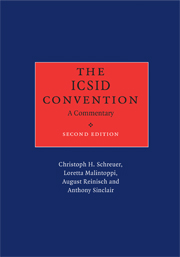Book contents
- Frontmatter
- Contents
- Foreword by Professor Sir Elihu Lauterpacht, CBE, QC
- Authors' preface to the second edition
- Table of cases
- List of abbreviations
- Text of the ICSID Convention
- Procedural calendar
- PREAMBLE
- CHAPTER I International Centre for Settlement of Investment Disputes
- CHAPTER II Jurisdiction of the Centre
- CHAPTER III Conciliation
- CHAPTER IV Arbitration
- CHAPTER V Replacement and Disqualification of Conciliators and Arbitrators
- CHAPTER VI Cost of Proceedings
- CHAPTER VII Place of Proceedings
- CHAPTER VIII Disputes between Contracting States
- CHAPTER IX Amendment
- CHAPTER X Final Provisions
- Article 67 Signature
- Article 68 Ratification and Entry into Force
- Article 69 Implementing Legislation
- Article 70 Territorial Application
- Article 71 Denunciation
- Article 72 Continuing Effect of Consent
- Article 73 Depositary
- Article 74 Registration
- Article 75 Notifications by Depositary
- Final Clause
- Consolidated bibliography
- Index by article
- Index by subject
Article 69 - Implementing Legislation
from CHAPTER X - Final Provisions
Published online by Cambridge University Press: 07 September 2010
- Frontmatter
- Contents
- Foreword by Professor Sir Elihu Lauterpacht, CBE, QC
- Authors' preface to the second edition
- Table of cases
- List of abbreviations
- Text of the ICSID Convention
- Procedural calendar
- PREAMBLE
- CHAPTER I International Centre for Settlement of Investment Disputes
- CHAPTER II Jurisdiction of the Centre
- CHAPTER III Conciliation
- CHAPTER IV Arbitration
- CHAPTER V Replacement and Disqualification of Conciliators and Arbitrators
- CHAPTER VI Cost of Proceedings
- CHAPTER VII Place of Proceedings
- CHAPTER VIII Disputes between Contracting States
- CHAPTER IX Amendment
- CHAPTER X Final Provisions
- Article 67 Signature
- Article 68 Ratification and Entry into Force
- Article 69 Implementing Legislation
- Article 70 Territorial Application
- Article 71 Denunciation
- Article 72 Continuing Effect of Consent
- Article 73 Depositary
- Article 74 Registration
- Article 75 Notifications by Depositary
- Final Clause
- Consolidated bibliography
- Index by article
- Index by subject
Summary
INTRODUCTION
The measures that are necessary to make a treaty effective in the domestic legal sphere vary depending on the respective constitutional system. Some countries, such as the United Kingdom, require legislation to incorporate treaties into their domestic law. In other countries, such as the United States, treaties that have been duly promulgated internally may be applied in principle. But even in countries where treaties are susceptible of direct application, implementing legislation may be necessary. Especially in areas of the law where there is detailed domestic legislation, it is often necessary to bring this legislation into line with treaty obligations. The law governing arbitration is such an area.
Art. 69 deals with the duty of States parties to the Convention to take the measures necessary in their domestic law to carry out their obligations under the Convention. Art. 69 does not address the possibility of giving consent to jurisdiction under Art. 25. Consent to jurisdiction may be offered through the host State's legislation (see Art. 25, paras. 392–426). But consent to jurisdiction is voluntary and there is no obligation of a Contracting State to give it (see Art. 25, paras. 374–377). While an offer of consent through a State's legislation would make the Convention more effective, this type of legislation is not necessary to carry out the obligations under the Convention in the Sense of Art. 69.
- Type
- Chapter
- Information
- The ICSID ConventionA Commentary, pp. 1273 - 1275Publisher: Cambridge University PressPrint publication year: 2009



